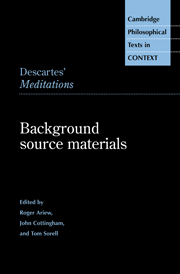Book contents
- Frontmatter
- Contents
- Preface
- Abbreviations
- General Introduction
- 1 Dialectic
- 2 That Nothing Is Known
- 3 The Promotion of Mathematics
- 4 Metaphysical Disputations
- 5 Wisdom
- 6 A Compendium of Philosophy in Four Parts
- 7 Corpus of Philosophy
- 8 The Use of Reason, The Impiety of the Deists, and The Truth of the Sciences
- 9 Unorthodox Essays against the Aristotelians
- 10 The Two Truths and The Immortality of the Soul
- 11 Dialogue on the Diversity of Religions and Little Skeptical Treatise
- 12 Universal Science
- 13 That God Exists
- Appendix: Condemnations of Cartesianism
- Bibliography
- Index
General Introduction
Published online by Cambridge University Press: 05 June 2012
- Frontmatter
- Contents
- Preface
- Abbreviations
- General Introduction
- 1 Dialectic
- 2 That Nothing Is Known
- 3 The Promotion of Mathematics
- 4 Metaphysical Disputations
- 5 Wisdom
- 6 A Compendium of Philosophy in Four Parts
- 7 Corpus of Philosophy
- 8 The Use of Reason, The Impiety of the Deists, and The Truth of the Sciences
- 9 Unorthodox Essays against the Aristotelians
- 10 The Two Truths and The Immortality of the Soul
- 11 Dialogue on the Diversity of Religions and Little Skeptical Treatise
- 12 Universal Science
- 13 That God Exists
- Appendix: Condemnations of Cartesianism
- Bibliography
- Index
Summary
Philosophy, more perhaps than any other discipline, has always been preoccupied with itself – with what kind of activity it is, or should be. In dissections of the current state of the subject, a distinction is often deployed between approaches to philosophy that take pride in meticulous attention to its history, and those that disdain the close study of past ideas as irrelevant to the cutting edge of modern philosophical research. Though each of these polar stereotypes has its instantiations, the sharp contrast can mislead, since many, if not most, practitioners of the subject fall somewhere between the extremes – and so much the better for that. For the truth is that the history of philosophy can easily turn sterile if it lacks a sense of how the great issues of the past are related to the continuing philosophical debates of our own time; and conversely, the practice of “up-to date” analytic philosophy risks becoming obsessive and shortsighted unless it is informed by a lively awareness of the philosophical tradition that delivered us where we are today. Fruitful philosophical analysis, like individual self-discovery, operates at a point of interplay between the struggle toward a future not yet achieved, and the effort to recover and understand the past we have (partly) left behind.
Yet to acknowledge the vital role of inherited tradition for productive philosophical inquiry is immediately to confront the problem of how that tradition is itself generated.
- Type
- Chapter
- Information
- Descartes' MeditationsBackground Source Materials, pp. xiii - xviiiPublisher: Cambridge University PressPrint publication year: 1998



